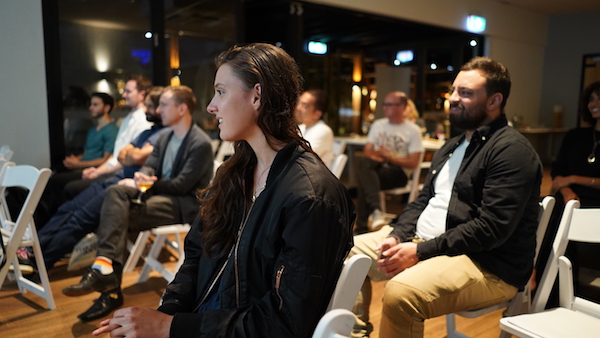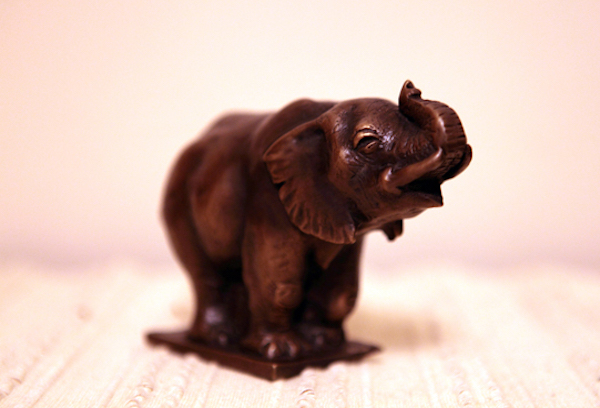As there were no AACTA Meet the Nominees events in 2018, the NSW ASE decided to run our own Meet the Winners event. We got such a great response from our Ellies and AACTAs winners that we opted to run two events.
Meet the Winners Part 1 was on 20 March at the lovely Camperdown Commons. Editors got themselves some food and drinks then settled in to see Jane St Vincent Welch ASE chat with Karen Johnson (AACTA Award for Best Editing in a Documentary for "Ghosthunter One"), Andrea Lang ASE (Audio Network Award for Documentary Feature for "Back Track Boys"), Karen Pearlman (Digistor Award for Open Content for "After the Facts"), Harriet Clutterbuck ASE (co-winner with Sam Hart of Spectrum Films Award for Documentary for "Hawke: The Larrikin and the Leader") and Andrew Holmes (ASE Award for Branded Content for "2017 Byron Bay Festival").
(Karen Pearlman, Harriet Clutterbuck ASE, Andrew Holmes, Andrea Lang ASE, Karen Johnson,
Jane St Vincent Welch ASE. Photo by Adrian Barac.)
Karen Pearlman's short film 'After the Facts' looks at something that is commonly called 'The Kuleshov Effect' and asks why is something that lots of Editors were doing in early film is named the man who observed them doing it? Karen's film reclaims this key idea about editing and renames it: 'The Editor's Effect'. Karen talked about how editing is intuitive, and that we have to respect that intuition, but the problem is that makes it hard to teach. So Karen wants to know: what do we mean by intuition? What are the things that Editors are doing that are, in a way, going on below the surface of what they are conscious of thinking about? Editors don't realise they are exceptionally good at remembering. We don't tend to think it is a big thing to remember, say, 10 hours of rushes. But most people couldn't do that! It feels "natural" to us. It isn't, really, it is a skill we had to develop. One thing Editors are good at that is "natural" though, is the ways we use our own heartbeats, breath rhythms, and neurological 'mirroring' of material to guide our feeling for rhythm. Karen also talked about how Editors shape the movement of images, emotions, events and ideas by responding to the material around us and to the feeling for the material that the directors (or producer, or clients) bring into the room with them. This kind of thinking, which involves not just the Editor's brain, but their bodies, their tools, and the filmed material, is what cognitive philosophers call "extended mind". (OK, this stuff is impossible to summarise accurately - read Karen's work if you want to know more.)
Karen Johnson jumped at the chance to edit a film about a paranormal investigator, however she didn't address the ghost hunting footage for a while. She became much more interested in finding out who the ghosthunter, Jason, REALLY was because he was hiding aspects of his true character . "Ghosthunter" 'became a portrait of a man with complex issues.' The ghost hunt footage was woven throughout the film, using Jason's interactions with the other hunters to illustrate the many layers of his character. (However, by the end of film both the director and Karen believed in ghosts.)
The director had been shooting for seven years before Karen came onboard - her first cut was eight hours! As filming continued so did the twists and surprises from Jason's life. Karen found herself helping work out a creative compromise between the director and the executive producers who were wanting to change the storytelling style of the film, Karen believes that it's always the director's film and that that the edit room should be a safe creative space for the director. Karen has a young family so she works two days a week from home and three in the city. Most producers and directors are supportive of this arrangement.
(Photo by Adrian Barac.)
When Andrea Lang ASE heard that "Back Track Boys" was about 'boys in trouble and dogs,' she said, 'I'm there.' Andrea said, "We just wanted it to be exactly like drama so we tried to run dramatic plot lines," and make the boys' stories as moving as possible. They used the dogs as a kind of Greek Chorus, reacting to events. To try and make the audience like someone who's unlikable, you look for every little glance, any softness in them. However, the boys behaved themselves too much around the camera so one of Andrea's favourite moments is a boy swearing his head off. Andrea advised that when you have a weak thing in your film, put the strongest thing you've got at the front, then you get away with it not being so strong later on. Andrea and Jane discussed using contrast and layering to build a character to help guide the audience in how to read a significant moment.
Good editing jobs tend to take over Andrea's life and becomes more important than anything, until she's "spat out the other end" and realises, "It was only a film." Andrea believes Editors should try to get in characters' heads and bring out the things you want to say about them. And if you work on films about topics you believe are important, then the editing is easy as "you're just making a propaganda piece for yourself". Andrea prefers working at home, on her own gear, preferably outside among the trees. Andrea also advised that when you have a good run on a good film, just bloody enjoy it while it lasts.
Andrew Holmes is more familiar with TV commercials, music videos and title sequences for films, so the promotional video for the 'Byron Bay Film Festival' was something of a change of pace, providing a unique and exciting opportunity to collaborate directly with the film-makers on this artistic experiment.
Talking to his craft, Andrew explains that the ability to extract 'the golden moments' from rushes requires a strong knowledge of storytelling and a good eye for composition. Important to any visual narrative is the soundscapes that are built to support it. By crafting layers of sound design that accentuate moments, this can bring the images to life and create more emotion. Andrew said the 'Byron Bay' edit was an amazing opportunity to work closely with a bunch of film-makers, collaborating and exploring ideas and developing visual narratives that would work for this particular film. The amazing footage was shot by one of Australia's best DOPs and Andrew had the luxury of two weeks to craft something special, a timeline he’s unaccustomed to in the fast-paced worlds he usually works in.
Harriet Clutterbuck ASE was on holidays in the Warrumbungles when she got a call offering her an urgent editing job starting the next day. Sam Hart, the editor of "Hawke: The Larrikin and the Leader" episode two, had to go to another job, so after a 6-hour drive, Harriet found herself thrust into the chaotic final weeks of an edit with both the deadline and Christmas looming. After a three-month edit, the episode had a really good structure with a spine of interviews and archival in place arranged in themes, however its opening had been poached to become the ending of episode one so Harriet had to create a new opening and recut some scenes. As scenes were rewritten, Harriet kept recutting which involved restructuring and finding new interview grabs and archival footage. The group discussed the difficulties of wading through archival footage in the quest for exactly the right piece or image.
There was also some discussion on the discomfort of replacing an Editor on a job or being replaced on a job. Jane suggested there should be a culture of Editors looking after each other, perhaps trying to have a chat with the Editor you're replacing. The group discussed the advantages of explicitly raising the topic of credits in all jobs
It was a fantastic discussion and impossible to cover properly in an article - so much has been left out.
Meet the Winners!
Are you ready to be inspired for another year of editing?
Winners of the 2018 Ellies and AACTA Editing Awards are gathering
to chat about their award-winning works, and the ins and outs of editing
drama, documentary, reality, factual and open content.
Jane St Vincent Welch ASE will be chatting with our panellists:
Karen Johnson - AACTA Award for Best Editing in a Documentary for "Ghosthunter One"
Andrea Lang ASE - Audio Network Award for Documentary Feature for "Back Track Boys"
Karen Pearlman - Digistor Award for Open Content for "After the Facts".
Harriet Clutterbuck ASE - co-winner with Sam Hart of Spectrum Films Award for Documentary for "Hawke: The Larrikin and the Leader"
Andrew Holmes - ASE Award for Branded Content for "2017 Byron Bay Festival".
Wednesday 20 March - 7:00pm
Camperdown Commons - Common Room
31a Mallet Street,
Camperdown
http://camperdown.commons.com.au/welcome
(There’s eating places if you want to come early and treat yourself to dinner,
and a bar for drinks throughout the night!)
RSVP to rsvp@screeneditors.com.au, or just rock up on the night!


